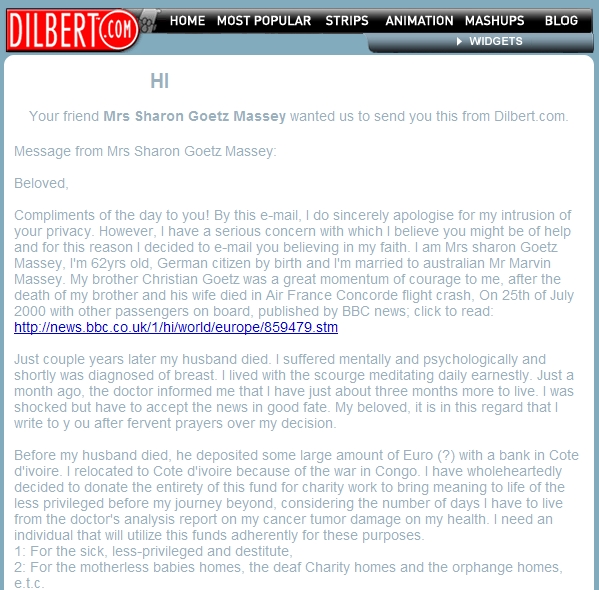419 scammers using Dilbert.com

On their way to search for clean IPs through which to send out yet another scam email, 419 con-artists (Mrs Sharon Goetz Massey) have recently started using Dilbert.com's recommendation feature in an attempt to bypass anti-spam filters -- and it works. The use of Dilbert.com's clean IP reputation comes a month after 419 scammers used the same tactic on NYTimes.com 'email this' feature.
Isolated incidents or an indication of a trend? 419 scammers are like spammers circa 1997, technically unsophisticated but fully capable of maintaining a fraudulent infrastructure by using legitimate services only.
Case in point - automatically registered email accounts next to compromised ones already represent the source of a close to 20% of the overall spam volume, and these levels remain steady. A logical question arises, why hasn't 419 advance-fee fraud reached the efficiency levels of phishing or spam in general, taking into consideration the fact that spam is already outsourced as a process? It's because South Africa-based scammers lack the networking skills necessary to approach international cybercrime groups which would not only manage the entire scamming process for them, but would help them improve the quality of the campaigns.
Data detailing the magnitude of advance-fee fraud varies. According to the U.S Internet Crime Complaint Center, Nigerian letter fraud represented a 5.2% of the total loss reported in their annual 2008 report, with non-delivery scams topping the chart. Internationally, the number of advance-fee fraud cases and the number of victims is higher:
In the last two years, the Electronic and Financial Crimes Commission (EFCC) of Nigeria has been putting scammers in jail. The commission has invited journalists on a successful high-profile operation to apprehend a scamming ring and has helped foil Nigerian-led groups that ran multimillion-dollar fraud schemes. In a 2007 report, the EFCC said it handled more than 18,000 advanced-fee fraud cases, a six-fold increase in just four years.
From a technical perspective, advanced-fee fraud is still in its infancy, however the results of its tactics are pretty evident in the face of the thousands of scammed people across the globe. Don't be one of them, spot the scam, take a minute and report it.